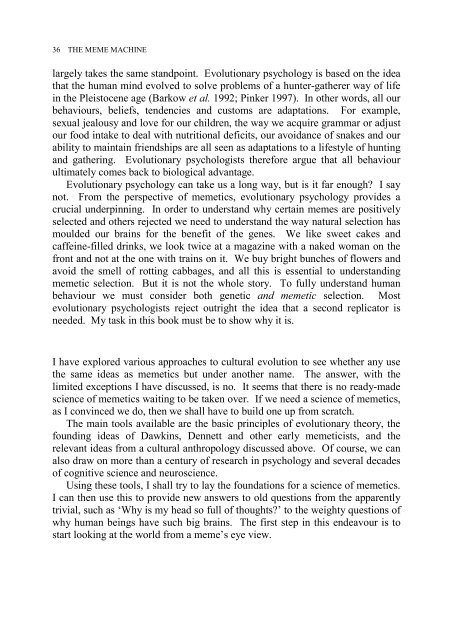The Meme Machine
TheMemeMachine1999
TheMemeMachine1999
- No tags were found...
Create successful ePaper yourself
Turn your PDF publications into a flip-book with our unique Google optimized e-Paper software.
36 THE MEME MACHINE<br />
largely takes the same standpoint. Evolutionary psychology is based on the idea<br />
that the human mind evolved to solve problems of a hunter-gatherer way of life<br />
in the Pleistocene age (Barkow et al. 1992; Pinker 1997). In other words, all our<br />
behaviours, beliefs, tendencies and customs are adaptations. For example,<br />
sexual jealousy and love for our children, the way we acquire grammar or adjust<br />
our food intake to deal with nutritional deficits, our avoidance of snakes and our<br />
ability to maintain friendships are all seen as adaptations to a lifestyle of hunting<br />
and gathering. Evolutionary psychologists therefore argue that all behaviour<br />
ultimately comes back to biological advantage.<br />
Evolutionary psychology can take us a long way, but is it far enough? I say<br />
not. From the perspective of memetics, evolutionary psychology provides a<br />
crucial underpinning. In order to understand why certain memes are positively<br />
selected and others rejected we need to understand the way natural selection has<br />
moulded our brains for the benefit of the genes. We like sweet cakes and<br />
caffeine-filled drinks, we look twice at a magazine with a naked woman on the<br />
front and not at the one with trains on it. We buy bright bunches of flowers and<br />
avoid the smell of rotting cabbages, and all this is essential to understanding<br />
memetic selection. But it is not the whole story. To fully understand human<br />
behaviour we must consider both genetic and memetic selection. Most<br />
evolutionary psychologists reject outright the idea that a second replicator is<br />
needed. My task in this book must be to show why it is.<br />
I have explored various approaches to cultural evolution to see whether any use<br />
the same ideas as memetics but under another name. <strong>The</strong> answer, with the<br />
limited exceptions I have discussed, is no. It seems that there is no ready-made<br />
science of memetics waiting to be taken over. If we need a science of memetics,<br />
as I convinced we do, then we shall have to build one up from scratch.<br />
<strong>The</strong> main tools available are the basic principles of evolutionary theory, the<br />
founding ideas of Dawkins, Dennett and other early memeticists, and the<br />
relevant ideas from a cultural anthropology discussed above. Of course, we can<br />
also draw on more than a century of research in psychology and several decades<br />
of cognitive science and neuroscience.<br />
Using these tools, I shall try to lay the foundations for a science of memetics.<br />
I can then use this to provide new answers to old questions from the apparently<br />
trivial, such as ‘Why is my head so full of thoughts?’ to the weighty questions of<br />
why human beings have such big brains. <strong>The</strong> first step in this endeavour is to<br />
start looking at the world from a meme’s eye view.



